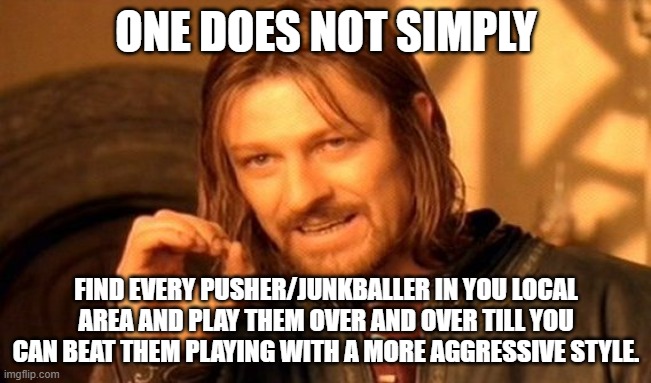I'm a beginner player and feel like I will stay this way forever.
What are important keys/techniques to learn to climb the skills ladder?
Recall a time when you learned a new skill: did it feel the same way? And yet over time and practice, you got a lot better at it. Learning a new language, for example: you enter a world that is completely foreign, where almost nothing makes sense. And gradually, you become more familiar and the foreign-ness recedes.
Well, tennis is a different language. If you're athletic and can cross over easily, the language is similar [someone who can read one of the Romance languages like Italian, French, Spanish, Portuguese, etc] can also read any of the others reasonably well because they are so similar.
If you're not athletic, the transition is much bigger, like going from Italian to Cambodian.
My most important advice is to be patient with yourself. Remember, this is supposed to be fun. Don't focus on outcomes [I have to reach level x by time y; I have to beat A, B, & C; etc.]. Instead, focus on the process [improving stroke x; better fitness; stronger mental outlook; etc]. If you do that, the results will take care of themselves.
For example at my level, most if not all players hit the serve like beach badminton. Some hit it like this and still the ball goes very fast.
Would learning the proper serve or spin and slice on the serve be a big improvement step? Or maybe more topspin in general? In doubles is it about learning to go to the net more often? Learning where to stand?
In your game, what are key things you learned that dramatically helped improve your game?
If you have the time and disposable income, engage a coach. Don't choose willy nilly: interview them, explain what your goals are and what you're willing to do to achieve them, and have them explain how they can help you get there. Your personality has to mesh with their style: they could be the greatest coach in the world but if you don't get along, it won't be a productive relationship.
There are great resources on the internet; you just have to be able to separate the wheat from the chaff. Also, one person's wheat might be another person's chaff. Everyone has their favorites. I like [in no particular order]:
- Top Tennis Training
- Essential Tennis
- Feel Tennis
- My Tennis HQ
- Intuitive Tennis
Just don't fall into the trap of substituting watching videos for actual practice and matches. Otherwise, you fall victim to the "shiny watch" syndrome where you're perpetually distracted by the next new thing and never reap the benefit of any one piece of instruction.
If you do take lessons, practice what you've learned. Don't hit against the wall for 10 minutes prior to your next lesson and think that will cement what you learned a week ago; unless you are supremely talented, it won't. You should be putting in multiple hours of practice for every hour of lessons. You'll have to figure out what ratio works for you.
Most tennis matches are lost, not won. By that I mean that the error count is almost always higher than the winner count. The majority of points are lost due to an error rather than won by a winner. One underrated skill is the ability to consistently keep the ball in play. We highlight reel, attention deficit, immediate gratification people love the flashy winner but that doesn't usually win matches.
Pay attention to the 3Fs: footwork, fitness, focus <mental toughness>, and spacing <the space between your body and the ball; most tend to get cramped>. These are foundational skills and can all be worked on without a court or any equipment. They are also very non-flashy: when was the last time you watched a highlight reel of someone doing ladder drills or stair sprints?
Your questions span a really broad range of skills. I'd dial it back and again, focus more on the process. Let your coach guide you.
Notice that I said nothing about topspin RPMs, serve MPH, one-handed vs two-handed BHs, grips, strings, etc. That was deliberate.
Welcome to the forum and the game; may it be a lifelong journey.

